Author Spotlight: An Interview with Shane Speal, King of Cigar Box Guitars
Meet the Man Who Re-invented the Cigar Box Guitar and Sparked a New DIY Instrument Movement
Shane Speal, Author of the Making Poor Man’s Guitars: Cigar Box Guitars & Other DIY Instruments
Nothing says ‘Americana’ more than a cigar box guitar. This primitive instrument cobbled together from discarded wood, guitar strings, and an empty cigar box—was the poor man’s guitar of the early nineteenth and twentieth centuries. For decades, it was a forgotten instrument though; that is until Shane Speal brought this DIY guitar back to life and created a cult following.
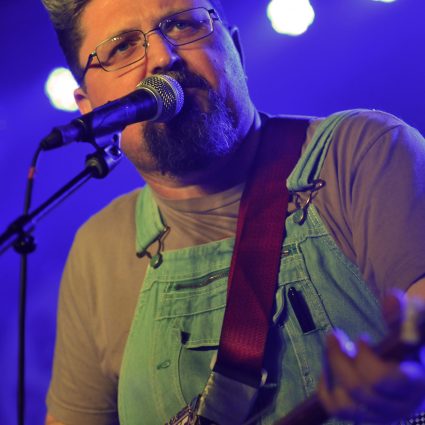
In addition to creating an online community for cigar box guitar enthusiasts, which went viral in 2004 and has not lost steam since, he re-creates cigar box guitars and plays them in a DIY-instrument band called Shane Speal and the Snakes. He’s also released six full-length cigar box guitar albums under the same name, has a cigar box guitar museum in New Alexandria, PA, and has made 2,000 cigar box guitars to date. Suffice it to say, his nickname—King of Cigar Box Guitars—is well deserved.
Fox Chapel Publishing caught up with Shane Speal in East Petersburg, PA to talk about the DIY movement, social media, and inspiration…
In your own words, what is the DIY music movement?
It’s the act of casting off any rules when it comes to instrument design, playing, and exploration. When you make your own guitar, you can give it one string or a few dozens. You can tune it however you want and invent your own playing style. Personally, I started building my own cigar box guitars because I wanted an instrument that went one step deeper than the old Delta Blues recordings of the 1920’s.
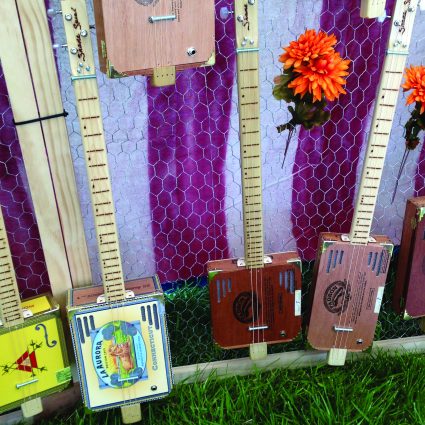
Why do you do what you do?
I play cigar box guitar because it makes sense to me, in the same way, a cello makes sense to Yo-Yo Ma. When I play a conventional guitar, I sound like a bad copy of Jimi Hendrix, but when I play cigar box guitar, I sound like Shane Speal. I encourage others to explore DIY instruments because I want to see them discover the same joy and passion I’ve been feeling for 25 years. I play the blues because it’s the most primal, soul-stirring music I’ve ever heard.
Who or what influenced you to learn how to play guitar?
I saw KISS on the Midnight Special TV show in 1975 and it changed my life. When I was a kid, I wanted to be Gene Simmons. Now that I’m older, I still want to be Gene Simmons.
Who or what influenced you to make cigar box guitars?
Back in 1993, I was so enraptured by the blues, I desperately wanted to keep finding deeper forms of the style. I started with Jimi Hendrix and then went back in time to Muddy Waters and Hound Dog Taylor. Eventually, I was listening to the earliest blues recordings from the 1920’s, the gritty, mean stuff that sounded like dirt and sweat. I wanted to play stuff like that, only deeper. When I came across Carl Perkins’ account of his first two-string cigar box guitar, I knew that was going to be the key element for my quest.
Your ears and your creativity are the greatest tools.
What DIY instrument tools do you need to get started and can not live without?
Your ears and your creativity are the greatest tools. I once read about the artist, Peter Whitehead performing on stage with a plastic bag full of seashells in which he would pick up and drop to the floor repeatedly to the beat. Anything can be an instrument!
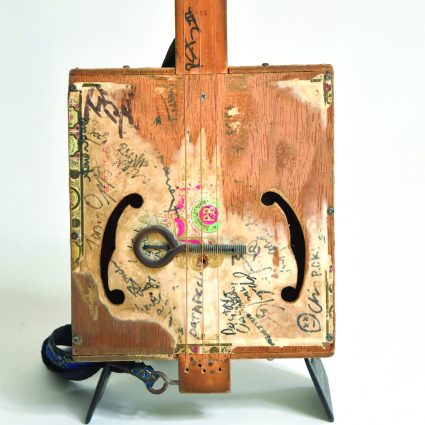
Out of all the instruments in the book what is your favorite and why?
The wretched, beat-to-hell cigar box guitar made from a Macanudo cigar box is like my right hand. I built it in 1996 and it’s been on hundreds of stages and all of my albums. I used it as the template for the three-string cigar box guitar plans in Chapter Two because it’s the best cigar box guitar I’ve ever played.
What jobs have you done, other than being an author?
I’m currently a full-time musician and blogger. I also run the online store, StubbySlide.com which specializes in handmade, collectible and rare guitar slides for cigar box guitarists. I created the documentary, Chasing Steam which explores the world’s loudest acoustic instrument, a playable factory steam whistle in York, Pennsylvania. In the past, I’ve made a living selling cigar box guitars, being a marketing director, a radio advertising rep, and even a forklift operator.
If you had to pick one artist or band that inspires you, who would it be and why?
There are two…
The first is Eddie “One String” Jones, an obscure vagrant street musician from the early 1960’s. He played a one-string “diddley bow” instrument cobbled from a scrap of wood, a paint can, two bottles, and a broom wire. Two music researchers discovered him on LA’s skid row and made several field recordings of him. Those recordings were later released on the record, One String Blues. Eddie “One String” Jones had fabulous pitch control and could play that single string as his life depended on it.
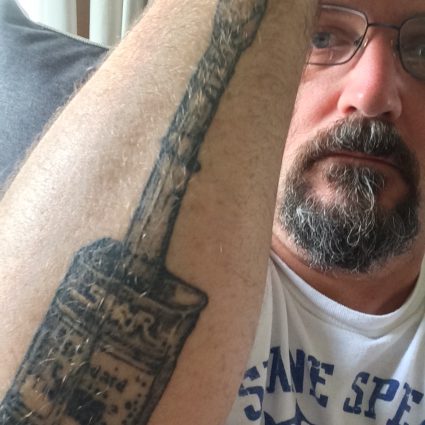
The second is Wesseh Freeman, a blind musician from Liberia who played a three-string guitar made from a gas can, coat hanger frets and brake wires for strings. A video of Wesseh performing on the streets went viral in 2014 and it blew me away. I was able to track him down through an American ministry that works in Monrovia and was able to become friends with him via Skype and phone calls. Wesseh’s guitar was the crudest piece of trash, yet he played the most fantastic African reggae on it. After getting to know him, I gathered my fan base and we raised enough money to get him an apartment of his own along with food and support. Earlier this year, Wesseh was tragically killed as he walked along a road and a reckless driver ran into him. The fans stepped up again and paid for all his funeral costs. I recently got a tattoo on my right arm of Wesseh’s gas can guitar.
You have a huge YouTube and social following. What advice do you have for other authors/artist/musicians looking to grow their audience?
I built my entire following by giving. None of this was from any videos going viral. It’s just years of work. I’ve been actively online since 2002 and I’ve continually posted building tips, playing secrets and any history that I’ve dug up. The more I give, the more people follow me.
What led you to write this book?
It was my backup plan after failing as a Soundcloud rapper. 😉
About the Book
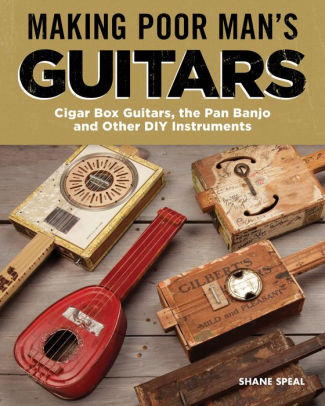 Shane Speal’s book, Making Poor Man’s Guitars: Cigar Box Guitars & Other DIY Instruments, is now available. Speal brings the making of music and musical instruments back to its roots. This book presents authentic stories that’ll give readers chills and insight into the untold story of America’s poverty-stricken DIY music communities—some stories date back to the beginning days of New Orleans’ jazz. The beauty of Making Poor Man’s Guitar is that it’s not your usual, tedious history book. It’s relevant, energetic, and insightful. It draws on American culture and a deep love of primal music making. The icing on the cake is that it doubles as a how-to book, allowing musicians to take this gem of history and reinvent it for themselves. Join the DIY music community and get your copy of Making Poor Man’s Guitars: Cigar Box Guitars & Other DIY Instruments.
Shane Speal’s book, Making Poor Man’s Guitars: Cigar Box Guitars & Other DIY Instruments, is now available. Speal brings the making of music and musical instruments back to its roots. This book presents authentic stories that’ll give readers chills and insight into the untold story of America’s poverty-stricken DIY music communities—some stories date back to the beginning days of New Orleans’ jazz. The beauty of Making Poor Man’s Guitar is that it’s not your usual, tedious history book. It’s relevant, energetic, and insightful. It draws on American culture and a deep love of primal music making. The icing on the cake is that it doubles as a how-to book, allowing musicians to take this gem of history and reinvent it for themselves. Join the DIY music community and get your copy of Making Poor Man’s Guitars: Cigar Box Guitars & Other DIY Instruments.
Making Poor Man's Guitars
Author Shane Speal brings the making of music and musical instruments back to its roots. Making Poor Man’s Guitars presents authentic stories that’ll give readers chills and insight into the untold story of America’s poverty-stricken DIY music communities—some stories date back to the beginning days New Orleans’ jazz. The beauty of Making Poor Man’s Guitar is that it’s not your usual, tedious history book. It’s relevant, energetic, and insightful. It draws on American culture and a deep love of primal music making. The icing on the cake is that it doubles as a how-to book, allowing musicians to take this gem of history and reinvent it for themselves.
Get Exclusive Email Offers And Receive 15% OFF On Your First Book Order!


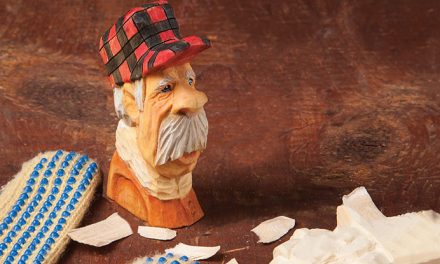
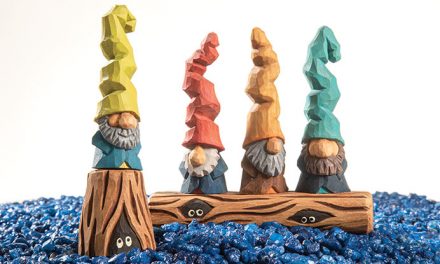
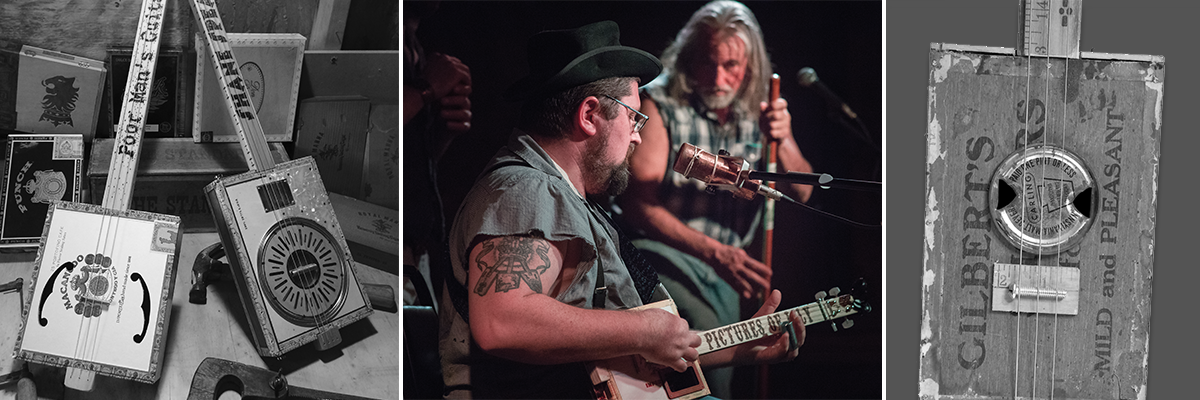
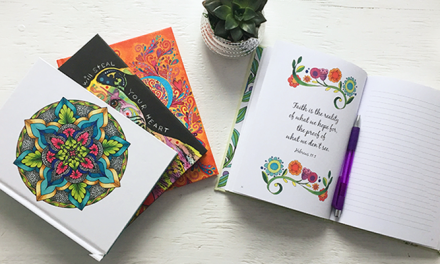
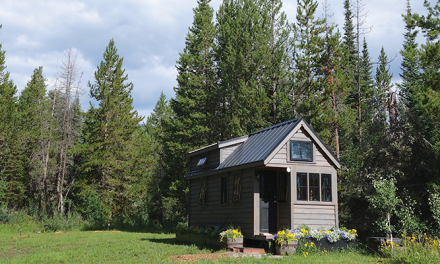

Recent Comments